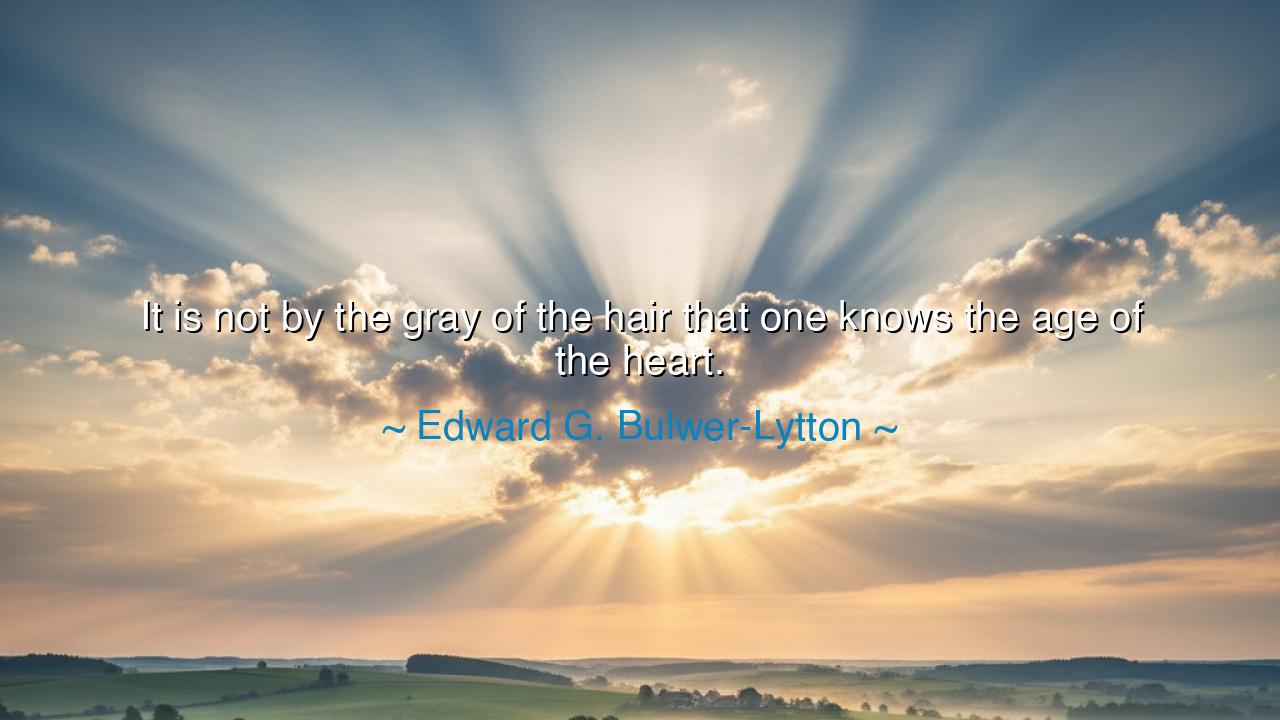
It is not by the gray of the hair that one knows the age of the






In the vast expanse of human experience, where the passage of time leaves its inevitable marks upon our bodies, there is one truth that transcends the outward signs of age: it is not the gray of the hair that reveals the age of the heart. Edward G. Bulwer-Lytton offers this profound insight when he states, "It is not by the gray of the hair that one knows the age of the heart." These words remind us that the true measure of our lives is not found in the physical changes we undergo, but in the vitality of our spirit, the depth of our passion, and the strength of our emotions. Our hearts do not grow old as quickly as our bodies; they are shaped by the choices we make, the love we give, and the wisdom we cultivate.
The ancients, who lived closely with the cycles of nature, understood well that age is not simply the count of years but the essence of living itself. Socrates, the great Greek philosopher, continued to teach and engage in spirited debates even in his later years, demonstrating that wisdom and curiosity do not fade with age. He famously said, "The unexamined life is not worth living," showing that the mind, like the heart, can remain youthful and vibrant, regardless of the passage of time. In this way, the heart of Socrates was ageless—full of wonder, insight, and a thirst for truth. The gray of his hair may have signaled the passage of time, but it was his passion for learning and his dedication to justice that defined his heart’s age.
Similarly, the Romans, in their reverence for elder statesmen, often saw those who had reached old age as individuals of great wisdom and experience. But even in the grand halls of Roman power, the heart of a person was not solely determined by the years they had lived. Cicero, despite the weight of his years and political struggles, remained fiercely dedicated to his principles and his love for the Roman Republic. In his writings, he showed that age was merely the framework, while the strength of character and determination were what kept the heart young. Cicero’s heart, though aged by time, continued to burn with the fire of conviction and purpose, qualities that no physical change could diminish.
In our own era, Bulwer-Lytton’s words ring as true as ever. We live in a world that often equates youth with beauty and vitality, placing high value on external appearances and the vigor of the body. Yet, as we grow older, we begin to realize that the true essence of a person is found in their heart—in how they love, in how they serve, and in how they choose to live each day with meaning. Consider the example of Nelson Mandela, who spent 27 years in prison, physically constrained by the limitations of age and captivity, yet his heart remained unbroken, filled with an unwavering commitment to justice and peace. Mandela’s heart, far from growing old and weary, grew even more powerful with time, demonstrating that the age of the heart is not bound by the number of years lived but by the depth of conviction and courage one carries within.
The lesson that Bulwer-Lytton imparts is a timeless one: while our bodies may change, our hearts have the potential to remain forever young. The gray hair may be a symbol of experience, but it does not determine the vitality of our inner lives. The heart is a force of endurance, and it is through the choices we make, the love we give, and the wisdom we seek that it stays alive and vibrant. In times of adversity or triumph, it is the strength of our heart that carries us forward, not the years we have lived or the wrinkles we wear.
Practical action calls us to nurture the heart as much as we do the body. Exercise not just the physical form, but the mind and spirit. Foster relationships that feed the heart, and engage in pursuits that bring you joy, purpose, and meaning. Reflect often on what truly brings fulfillment to your life, knowing that the youthful spirit lies not in the absence of graying hair, but in the vigorous pursuit of life’s deeper truths. Cherish the connections you build, the wisdom you gain, and the love you share, for it is in these things that you preserve the age of your heart—and it is this heart, steadfast and passionate, that will guide you to your highest purpose.
As you continue on the journey of life, remember this truth: your heart need not grow old just because your body does. Embrace each stage of life with grace and intention, knowing that the heart’s true age is not measured in years, but in the depth of your experiences and the love you cultivate along the way. Age is but a number; the heart, forever untethered by time, remains the truest measure of our vitality.






AAdministratorAdministrator
Welcome, honored guests. Please leave a comment, we will respond soon